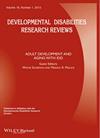Dewi Frances T. Depositario-Cabacar, Tesfaye-Getaneh Zelleke
{"title":"发育性残疾儿童癫痫的治疗","authors":"Dewi Frances T. Depositario-Cabacar, Tesfaye-Getaneh Zelleke","doi":"10.1002/ddrr.116","DOIUrl":null,"url":null,"abstract":"<p>Children with developmental disabilities are at increased risk for epilepsy with a prevalence rate higher than the general population. Some of the more common developmental disorders in childhood and the features of epilepsy in these conditions are discussed. Specifically, autism, cerebral palsy, mental retardation, and attention deficit and hyperactivity disorder are reviewed. Ideal treatment for developmentally-disabled children with epilepsy entails maximal seizure control without any significant adverse effects from the anti-epileptic drugs and good quality of life. Antiepileptic drugs' cognitive and behavioral adverse effects tend to occur more frequently in these children. Careful selection of the appropriate medication and close monitoring for drug adverse effects is important. The specific adverse effects of the older and newer antiepileptic drugs are also reviewed. © 2010 Wiley-Liss, Inc. Dev Disabil Res Rev 2010;16:239–247.</p>","PeriodicalId":55176,"journal":{"name":"Developmental Disabilities Research Reviews","volume":"16 3","pages":"239-247"},"PeriodicalIF":0.0000,"publicationDate":"2010-10-27","publicationTypes":"Journal Article","fieldsOfStudy":null,"isOpenAccess":false,"openAccessPdf":"https://sci-hub-pdf.com/10.1002/ddrr.116","citationCount":"45","resultStr":"{\"title\":\"Treatment of epilepsy in children with developmental disabilities\",\"authors\":\"Dewi Frances T. Depositario-Cabacar, Tesfaye-Getaneh Zelleke\",\"doi\":\"10.1002/ddrr.116\",\"DOIUrl\":null,\"url\":null,\"abstract\":\"<p>Children with developmental disabilities are at increased risk for epilepsy with a prevalence rate higher than the general population. Some of the more common developmental disorders in childhood and the features of epilepsy in these conditions are discussed. Specifically, autism, cerebral palsy, mental retardation, and attention deficit and hyperactivity disorder are reviewed. Ideal treatment for developmentally-disabled children with epilepsy entails maximal seizure control without any significant adverse effects from the anti-epileptic drugs and good quality of life. Antiepileptic drugs' cognitive and behavioral adverse effects tend to occur more frequently in these children. Careful selection of the appropriate medication and close monitoring for drug adverse effects is important. The specific adverse effects of the older and newer antiepileptic drugs are also reviewed. © 2010 Wiley-Liss, Inc. Dev Disabil Res Rev 2010;16:239–247.</p>\",\"PeriodicalId\":55176,\"journal\":{\"name\":\"Developmental Disabilities Research Reviews\",\"volume\":\"16 3\",\"pages\":\"239-247\"},\"PeriodicalIF\":0.0000,\"publicationDate\":\"2010-10-27\",\"publicationTypes\":\"Journal Article\",\"fieldsOfStudy\":null,\"isOpenAccess\":false,\"openAccessPdf\":\"https://sci-hub-pdf.com/10.1002/ddrr.116\",\"citationCount\":\"45\",\"resultStr\":null,\"platform\":\"Semanticscholar\",\"paperid\":null,\"PeriodicalName\":\"Developmental Disabilities Research Reviews\",\"FirstCategoryId\":\"1085\",\"ListUrlMain\":\"https://onlinelibrary.wiley.com/doi/10.1002/ddrr.116\",\"RegionNum\":0,\"RegionCategory\":null,\"ArticlePicture\":[],\"TitleCN\":null,\"AbstractTextCN\":null,\"PMCID\":null,\"EPubDate\":\"\",\"PubModel\":\"\",\"JCR\":\"\",\"JCRName\":\"\",\"Score\":null,\"Total\":0}","platform":"Semanticscholar","paperid":null,"PeriodicalName":"Developmental Disabilities Research Reviews","FirstCategoryId":"1085","ListUrlMain":"https://onlinelibrary.wiley.com/doi/10.1002/ddrr.116","RegionNum":0,"RegionCategory":null,"ArticlePicture":[],"TitleCN":null,"AbstractTextCN":null,"PMCID":null,"EPubDate":"","PubModel":"","JCR":"","JCRName":"","Score":null,"Total":0}
引用次数: 45

 求助内容:
求助内容: 应助结果提醒方式:
应助结果提醒方式:


